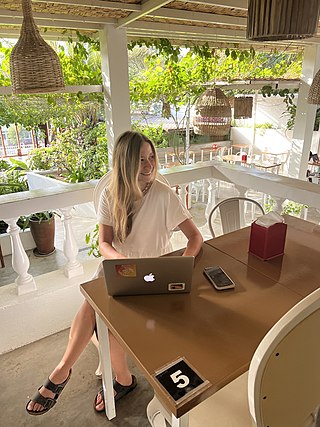
Macroeconomics is a branch of economics that deals with the performance, structure, behavior, and decision-making of an economy as a whole. This includes regional, national, and global economies. Macroeconomists study topics such as output/GDP and national income, unemployment, price indices and inflation, consumption, saving, investment, energy, international trade, and international finance.
An internship is a period of work experience offered by an organization for a limited period of time. Once confined to medical graduates, internship is used practice for a wide range of placements in businesses, non-profit organizations and government agencies. They are typically undertaken by students and graduates looking to gain relevant skills and experience in a particular field. Employers benefit from these placements because they often recruit employees from their best interns, who have known capabilities, thus saving time and money in the long run. Internships are usually arranged by third-party organizations that recruit interns on behalf of industry groups. Rules vary from country to country about when interns should be regarded as employees. The system can be open to exploitation by unscrupulous employers.

Temporary work or temporary employment refers to an employment situation where the working arrangement is limited to a certain period of time based on the needs of the employing organization. Temporary employees are sometimes called "contractual", "seasonal", "interim", "casual staff", "outsourcing", "freelance"; or the words may be shortened to "temps". In some instances, temporary, highly skilled professionals refer to themselves as consultants. Increasingly, executive-level positions are also filled with interim executives or fractional executives.
Gameplay is the specific way in which players interact with a game, and in particular with video games. Gameplay is the pattern defined through the game rules, connection between player and the game, challenges and overcoming them, plot and player's connection with it. Video game gameplay is distinct from graphics and audio elements. In card games, the equivalent term is play.
Freelance, freelancer, or freelance worker, are terms commonly used for a person who is self-employed and not necessarily committed to a particular employer long-term. Freelance workers are sometimes represented by a company or a temporary agency that resells freelance labor to clients; others work independently or use professional associations or websites to get work.
A consultant is a professional who provides advice or services in an area of specialization. Consulting services generally fall under the domain of professional services, as contingent work.
A virtual office is part of the flexible workspace industry that provides businesses with any combination of services, space and/or technology, without those businesses bearing the capital expenses of owning or leasing a traditional office.
Employability refers to the attributes of a person that make that person able to gain and maintain employment.
Open innovation is a term used to promote an information age mindset toward innovation that runs counter to the secrecy and silo mentality of traditional corporate research labs. The benefits and driving forces behind increased openness have been noted and discussed as far back as the 1960s, especially as it pertains to interfirm cooperation in R&D. Use of the term 'open innovation' in reference to the increasing embrace of external cooperation in a complex world has been promoted in particular by Henry Chesbrough, adjunct professor and faculty director of the Center for Open Innovation of the Haas School of Business at the University of California, and Maire Tecnimont Chair of Open Innovation at Luiss.
The degree of labour market flexibility is the speed with which labour markets adapt to fluctuations and changes in society, the economy or production. This entails enabling labour markets to reach a continuous equilibrium determined by the intersection of the demand and supply curves.
User experience design defines the experience a user would go through when interacting with a company, its services, and its products. User experience design is a user centered design approach because it considers the user's experience when using a product or platform. Research, data analysis, and test results drive design decisions in UX design rather than aesthetic preferences and opinions. Unlike user interface design, which focuses solely on the design of a computer interface, UX design encompasses all aspects of a user's perceived experience with a product or website, such as its usability, usefulness, desirability, brand perception, and overall performance. UX design is also an element of the customer experience (CX), and encompasses all aspects and stages of a customer's experience and interaction with a company.
Microblogging is a form of blogging using short posts without titles known as microposts. Microblogs "allow users to exchange small elements of content such as short sentences, individual images, or video links", which may be the major reason for their popularity. Some popular social networks such as Twitter, Threads, Mastodon, Tumblr, Koo, and Instagram can be viewed as collections of microblogs.
Human-centered design is an approach to problem-solving commonly used in process, product, service and system design, management, and engineering frameworks that develops solutions to problems by involving the human perspective in all steps of the problem-solving process. Human involvement typically takes place in initially observing the problem within context, brainstorming, conceptualizing, developing of concepts and implementing the solution.
Human-centered design is an approach to interactive systems development that aims to make systems usable and useful by focusing on the users, their needs and requirements, and by applying human factors/ergonomics, and usability knowledge and techniques. This approach enhances effectiveness and efficiency, improves human well-being, user satisfaction, accessibility and sustainability; and counteracts possible adverse effects of use on human health, safety and performance.

Digital nomads are people who travel freely while working remotely using technology and the internet. Such people generally have minimal material possessions and work remotely in temporary housing, hotels, cafes, public libraries, co-working spaces, or recreational vehicles, using Wi-Fi, smartphones or mobile hotspots to access the Internet. The majority of digital nomads describe themselves as programmers, content creators, designers, or developers. Some digital nomads are perpetual travelers, while others only maintain the lifestyle for a short period of time. While some nomads travel through multiple countries, others remain in one area, and some may choose to travel while living in a vehicle, in a practice often known as van-dwelling. In 2023, there are 17.3 million American digital nomads, which is a 131% increase since 2019.

A dongle is a small piece of computer hardware that connects to a port on another device to provide it with additional functionality, or enable a pass-through to such a device that adds functionality.
The sharing economy is a socio-economic system whereby consumers share in the creation, production, distribution, trade and consumption of goods, and services. These systems take a variety of forms, often leveraging information technology and the Internet, particularly digital platforms, to facilitate the distribution, sharing and reuse of excess capacity in goods and services.
Government crowdsourcing is a form of crowdsourcing employed by governments to better leverage their constituents' collective knowledge and experience. It has tended to take the form of public feedback, project development, or petitions in the past, but has grown to include public drafting of bills and constitutions, among other things. This form of public involvement in the governing process differs from older systems of popular action, from town halls to referendums, in that it is primarily conducted online or through a similar IT medium.
Digital labor or digital labour represents an emergent form of labor characterized by the production of value through interaction with information and communication technologies such as digital platforms or artificial intelligence. Examples of digital labor include on-demand platforms, micro-working, and user-generated data for digital platforms such as social media. Digital labor describes work that encompasses a variety of online tasks. If a country has the structure to maintain a digital economy, digital labor can generate income for individuals without the limitations of physical barriers.
New media studies is an academic discipline that explores the intersections of computing, science, the humanities, and the visual and performing arts. Janet Murray, a prominent researcher in the discipline, describes this intersection as "a single new medium of representation, the digital medium, formed by the braided interplay of technical invention and cultural expression at the end of the 20th century". The main factor in defining new media is the role the Internet plays; new media is effortlessly spread instantly. The category of new media is occupied by devices connected to the Internet, an example being a smartphone or tablet. Television and cinemas are commonly thought of as new media but are ruled out since the invention was before the time of the internet.

Gig workers are independent contractors, online platform workers, contract firm workers, on-call workers, and temporary workers. Gig workers enter into formal agreements with on-demand companies to provide services to the company's clients.




